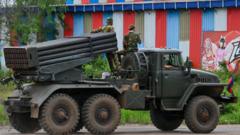The longstanding, troubled friendship between Thailand and Cambodia took a dark turn this week, resulting in significant military clashes and civilian casualties along their discordant border. Historically, the border area, dense with forest and contested territories, has seen sporadic conflict, but this situation appears especially grave. Reports indicate that at least 15 lives have been lost, predominantly civilians, while injuries have escalated following a landmine explosion that injured Thai soldiers.
In May, both nations had demonstrated a willingness to de-escalate tensions after the death of a Cambodian soldier; however, this fragile peace shattered last Thursday. This deterioration can be traced back to a leaked phone conversation between Thai Prime Minister Paetongtarn Shinawatra and Cambodia's leader Hun Sen, wherein she referred to him as "uncle" and criticized her military. This breach of trust has led to rapid fallout, with Paetongtarn now suspended from her position.
Critics have accused Paetongtarn of naive diplomacy, mistakenly counting on her family's historical ties with Hun Sen to navigate recent tensions. Their shared past has been marred by accusations and political machinations, including instances where each country's political leaders sought refuge across the border in times of crisis. The recent fallout has compounded existing grievances and economic challenges, further complicating matters between the two nations.
Political instability plagues both Thailand and Cambodia, with each country struggling economically in the aftermath of the pandemic. Cambodia's tourism sector, heavily reliant on Chinese visitors, continues to decline. Meanwhile, Thailand struggles to maintain a cohesive government amid economic pressures exacerbated by the U.S., complicating its diplomatic stance.
Hun Sen is employing aggressive rhetoric against Thailand, possibly in a bid to unify his domestic support while targeting Thaksin Shinawatra, Paetongtarn's exiled father, by hinting at compromising secrets. Meanwhile, Thailand has expelled the Cambodian ambassador, signifying a further deterioration in relations.
As this conflict escalates, the Association of Southeast Asian Nations (ASEAN) could play a pivotal role in mediating tensions, a responsibility it was founded to fulfill. The uncertain future raises questions about stability for both nations and the potential for further violence or a resolution to longstanding disputes. Observers are left to ponder why Hun Sen chose this moment to ignite an old rivalry, challenging both political friendships and regional cooperation.
In May, both nations had demonstrated a willingness to de-escalate tensions after the death of a Cambodian soldier; however, this fragile peace shattered last Thursday. This deterioration can be traced back to a leaked phone conversation between Thai Prime Minister Paetongtarn Shinawatra and Cambodia's leader Hun Sen, wherein she referred to him as "uncle" and criticized her military. This breach of trust has led to rapid fallout, with Paetongtarn now suspended from her position.
Critics have accused Paetongtarn of naive diplomacy, mistakenly counting on her family's historical ties with Hun Sen to navigate recent tensions. Their shared past has been marred by accusations and political machinations, including instances where each country's political leaders sought refuge across the border in times of crisis. The recent fallout has compounded existing grievances and economic challenges, further complicating matters between the two nations.
Political instability plagues both Thailand and Cambodia, with each country struggling economically in the aftermath of the pandemic. Cambodia's tourism sector, heavily reliant on Chinese visitors, continues to decline. Meanwhile, Thailand struggles to maintain a cohesive government amid economic pressures exacerbated by the U.S., complicating its diplomatic stance.
Hun Sen is employing aggressive rhetoric against Thailand, possibly in a bid to unify his domestic support while targeting Thaksin Shinawatra, Paetongtarn's exiled father, by hinting at compromising secrets. Meanwhile, Thailand has expelled the Cambodian ambassador, signifying a further deterioration in relations.
As this conflict escalates, the Association of Southeast Asian Nations (ASEAN) could play a pivotal role in mediating tensions, a responsibility it was founded to fulfill. The uncertain future raises questions about stability for both nations and the potential for further violence or a resolution to longstanding disputes. Observers are left to ponder why Hun Sen chose this moment to ignite an old rivalry, challenging both political friendships and regional cooperation.

















